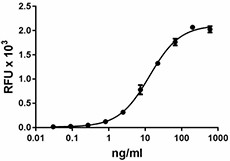- Regulatory Status
- RUO
- Other Names
- Glucocorticoid-induced TNFR-related protein (GITR), CD357, AITR

-

Immobilized mouse TNFRSF18 at 2µg/ml binds mouse TNFSF18 in a dose dependent manner.
| Cat # | Size | Price | Quantity Check Availability | ||
|---|---|---|---|---|---|
| 764402 | 10 µg | $229.00 | |||
| 764404 | 25 µg | $411.00 | |||
| 764406 | 100 µg | $1113.00 | |||
TNFRSF18 is a type I transmembrane protein that was initially identified from dexamethasone-treated murine T cell hybridoma cells and was designated GITR (for glucocorticoid-induced TNFR family-related gene). The mouse TNFRSF18 has 56% amino acid sequence identity to the human receptor. The human and mouse receptors contain three cysteine rich domains (CRD) in their extracellular region. TNFRSF18 expression is up-regulated in human peripheral mononuclear cells after stimulation with anti-CD3/CD28 monoclonal antibodies. TNFRSF18 interacts with TRAF1 (TNF receptor-associated factor 1), TRAF2, and TRAF3, and induces nuclear factor NFkB activation via TRAF2. TNFRSF18 is a key player in the differentiation of thymic Tregs (tTregs), and expansion of both tTregs and peripheral Tregs (pTregs). Human regulatory T cells (Tregs) constitutively expresses TNFRSF18. TNFRSF18 and its ligand are involved in the pathogenesis of autoimmune disease. Soluble forms for TNFRSF18 and TNFSF18 were detected in the serum of patients with primary Sjögren's syndrome, and those levels correlated with disease severity. Other autoimmune and allergic diseases have been associated to TNFRSF18 /TNFSF18 interaction as demonstrated in disease models of gastritis, thyroiditis, experimental autoimmune encephalomyelitis, and allergic airway inflammation.
Product Details
- Source
- Mouse TNFRSF18, amino acids (Ser22 - His153) (Accession # NP_033426) was expressed in 293E cells. The carboxy terminus contains SRIEGRMD-hIgGFc-6His tag.
- Molecular Mass
- The 377 amino acid recombinant protein has a predicted molecular mass of approximately 42.0 kD. The DTT-reduced and non-reduced protein migrate at approximately 60 kD and 100 kD respectively by SDS-PAGE. The predicted N-terminal amino acid is Ser.
- Purity
- > 95% by SDS-PAGE gel as determined by Coomassie stained SDS-PAGE.
- Formulation
- 0.22 µm filtered protein solution is in PBS, pH 7.2.
- Endotoxin Level
- Less than 0.01 EU per µg cytokine as determined by the LAL method.
- Concentration
- 10 and 25 µg sizes are bottled at 200 µg/mL. 100 µg size and larger sizes are lot-specific and bottled at the concentration indicated on the vial. To obtain lot-specific concentration and expiration, please enter the lot number in our Certificate of Analysis online tool.
- Storage & Handling
- Unopened vial can be stored between 2°C and 8°C for up to 2 weeks, at -20°C for up to six months, or at -70°C or colder until the expiration date. For maximum results, quick spin vial prior to opening. The protein can be aliquoted and stored at -20°C or colder. Stock solutions can also be prepared at 50 - 100 µg/mL in appropriate sterile buffer, carrier protein such as 0.2 - 1% BSA or HSA can be added when preparing the stock solution. Aliquots can be stored between 2°C and 8°C for up to one week and stored at -20°C or colder for up to 3 months. Avoid repeated freeze/thaw cycles.
- Activity
- Measured by functional ELISA. Immobilized recombinant mouse TNFRSF18 at 2 µg/ml binds mouse TNFSF18 (BL cat.# 752602) with an ED50 = 10 - 40 ng/ml.
- Application
-
Bioassay
- Application Notes
-
BioLegend carrier-free recombinant proteins provided in liquid format are shipped on blue-ice. Our comparison testing data indicates that when handled and stored as recommended, the liquid format has equal or better stability and shelf-life compared to commercially available lyophilized proteins after reconstitution. Our liquid proteins are verified in-house to maintain activity after shipping on blue ice and are backed by our 100% satisfaction guarantee. If you have any concerns, contact us at tech@biolegend.com.
Antigen Details
- Structure
- Homodimer
- Distribution
-
Low expression on resting T cells, B cells, and macrophages; high expression on CD25<sup>+</sup> CD4<sup>+</sup> Tregs and CD25<sup>+</sup> CD4<sup>+</sup> CD8<sup>-</sup> thymocytes.
- Function
- Differentiation of thymic Tregs (tTregs), and expansion of both tTregs and peripheral Tregs (pTregs). TNFRSF18 is stimulated in anti CD3/CD28 activated T cells.
- Interaction
- Macrophages, B cells, dendritic cells (DCs), and endothelial cells.
- Ligand/Receptor
- TNFSF18 (AITRL, GITRL, TL6)
- Biology Area
- Immunology, Costimulatory Molecules
- Molecular Family
- CD Molecules, Soluble Receptors
- Antigen References
-
1. Nocentini G, et al. 1997, Proc. Natl. Acad. Sci. USA. 94:6216.
2. Gurney AL, et al. 1999, Curr. Biol. 9:215.
3. Shimizu J, et al. 2002, Nat. Immunol. 3:135.
4. Tone M, et al. 2003, Proc. Natl. Acad. Sci. USA. 100:15059.
5. Gan X, et al. 2013, Clin. Dev. Immunol. 2013:340751.
6. Nocentini G, et al. 2012, Br. J. Pharmacol. 165:2089.
7. Ronchetti S, et al. 2015, J. Immunol. Res. 2015:171520. - Gene ID
- 21936 View all products for this Gene ID
- UniProt
- View information about GITR on UniProt.org
